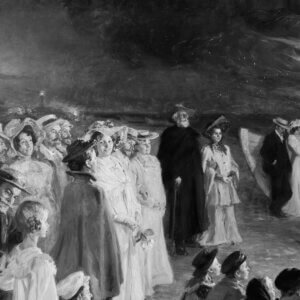
8.5
Aromanticism
Moses Sumney
“This isn’t protest music, it’s process music.” Moses Sumney’s debut full-length was preceded by a prose poem posted on his social media accounts explaining just what his album title Aromanticism meant. To him, it’s music about a lack of romantic love, or experiencing it to a lesser degree than most people do. The album is meant as a sonic dreamscape for that feeling. But for such a loveless album, it sure does sound romantic, doesn’t it?
There’s something almost subliminal to the appeal of Sumney’s voice, a gentle warble that reminds of Prince doing his best Thom Yorke impression. Throughout the album, it functions just like another instrument, slithering through lush arrangements and harmonizing like a string section. It’s a versatile tool that Sumney takes full advantage of throughout Aromanticism, often to great effect: look no further than the long-held seeeeeeeeecret on “Plastic” or the hypnotic refrain of “Make Out in My Car” to see how vocals fill out the album’s canvas while swooning strings and subtle electronic beats paint the details.
Sumney’s live shows often rely on little else than his voice, and most of the songs on Aromanticism could easily double as a capella tunes. “Self-Help Tape” takes this to the extreme, doing away with lyrics in favour of a sung bassline and multi-tracked vocals for an angelic outro to the record. Elsewhere, Sumney’s singing pairs beautifully with subtle instrumental palettes: “Don’t Bother Calling” spreads with buzzing violins and a low tune guitar arpeggio, while the strummed acoustics on “Indulge Me” call back to For Emma-era Bon Iver. “Plastic,” the most minimalistic track on an album full of them, sees Sumney singing along to a soft electric guitar in what sounds like Billie Holiday busking at a seaport.
Aromanticism is complete with fully realized soundscapes: the aquatic swell of single “Doomed,” the handclaps and triumphant horns of “Lonely World,” the Stevie Wonder outro on “Quarrell.” These instrumentals complement Sumney’s vocals beautifully, never taking the spotlight but elevating his performance effortlessly. His lyrics are evocative and ghostly: “I don’t know what we are / But every cell in the corpus resembles stars,” he sings on “Don’t Bother Calling,” one of several songs on the album about the uncertainty of a relationship. “Doomed” is probably the closest the album has to a mission statement, as Sumney’s sings in falsetto “If lovelessness is godlessness / Will you cast me to the wayside?” The theme of Aromanticism pervades through the album’s lost loves and complications as both a concept and a feeling, contrasting with its downright amorous sonics.
So much of the success of the album is due to how Sumney deploys his voice to highlight its strengths. There are so many opportunities for him to show his range without feeling shoehorned in, and each note hits at exactly the right frequency. Listening to the album feels almost hedonistic, a luxurious and decadent treat that doesn’t leave you with a stomachache. Aromanticism is the realisation of a promising talent that manages to make a meaningful statement on love, both romantic and platonic.
Words by Max James Hill
Latest Reviews
Trending
Tracks
Related Albums
Related News
Advertisement
Looking for something new to listen to?
Sign up to our all-new newsletter for top-notch reviews, news, videos and playlists.














